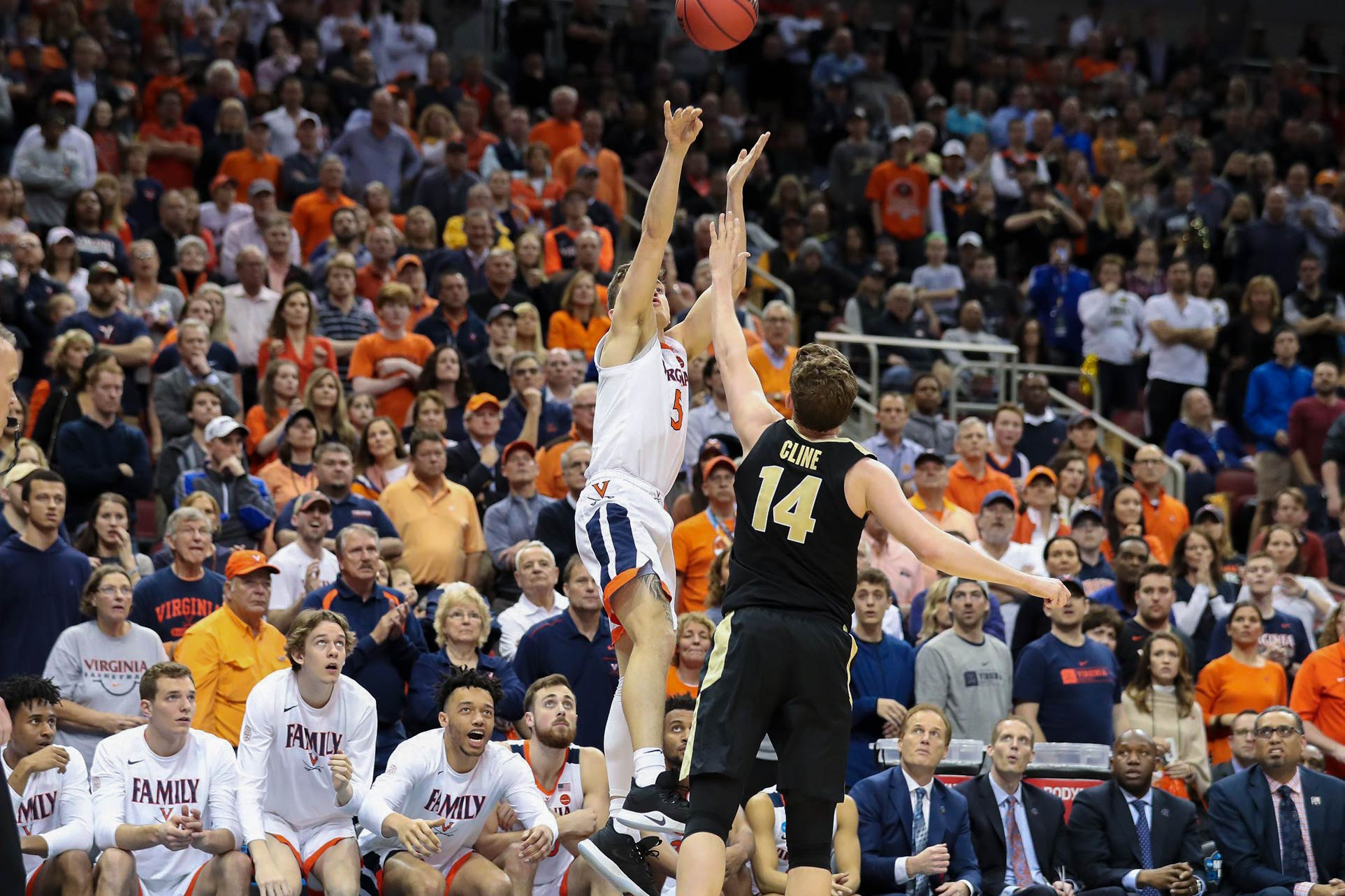For loyal University of Virginia men’s basketball fans, life is sweet. The team is headed to its first Final Four in 35 years after a thrilling Elite Eight win over Purdue. But the journey to Minneapolis hasn’t been easy. Those buzzer-beating thrills cannot happen without the tension of a near-loss, causing fans their fair share of consternation.
On Facebook, UVA alumni shared their stories of barely surviving the stress of UVA basketball-viewing.
“I was literally on the floor in front of the television clawing the carpet like a rabid animal,” wrote alumnus Ken Bryant of his experience watching the last minutes of regulation time against Purdue, before Mamadi Diakite’s game-tying shot.
Alumna Miya Hunter-Willis described the rituals that got her through those same moments as she watched the game alone in her bedroom: “I was pacing back and forth, wiping my forehead with an invisible towel, fearful that if I left the room that it would be viewed as disloyalty. The team NEEDED me. No snacks, no sleep.”
Some fans get so anxious they can’t watch the games outside of their homes. “I’ve determined that I can’t watch out in public due to the loud outburst, occasional curse words and constant pacing!” alumna Sofi Recio Cahoon wrote. “I’m sure my dogs wish I WOULD watch elsewhere as I freak them out with my screaming.”
Even the UVA Athletics Twitter account cheekily acknowledged the stress fans experienced during Game 1 of the NCAA Tournament against Gardner-Webb University:
Sorry, did we have you worried?
— Virginia Cavaliers (@VirginiaSports) March 22, 2019
Let's Go Hoos!#GoHoos #Wahoowa pic.twitter.com/TXtlp2AYK6
What causes us to experience such mental and physical agony during tight games? And is there anything we can do to ease the anxiety? UVA Today looked to Dr. John MacKnight, professor of internal medicine and primary care team physician for the University of Virginia athletic department, for advice before he traveled to Minneapolis this weekend.

Dr. John MacKnight is the co-medical director for sports medicine at UVA and the primary care team physician. (Contributed photo)
Q. What happens to our bodies (in terms of symptoms and causation) when we watch stressful games?
A. When we get stressed and excited watching games, we are stimulating our sympathetic (“fight or flight”) portion of our nervous system. This pushes up our heart rate and blood pressure, makes our palms sweat, and prepares our bodies to action, as you would need to do if being chased by a tiger. When you’re sitting in front of the TV watching a game, that’s a lot of physical preparation and nervous energy that has little outlet, since you’re not actually doing anything active.
Q. When it comes to Virginia games, one common refrain is: “That game took 10 years off my life!” Is there any truth to this?
A. There is no well-established link between the stress of watching sports and physical harm. It certainly can feel as though your body is doing things that must be harmful to you, but the reality is that the physical stress from watching exciting games is still well below what you would intentionally be trying to generate with a moderate-intensity workout in the gym. We often feel wiped out after a buzzer-beating thriller, but that’s primarily due to the emotional roller coaster that we ride in those games more than the physical toll that it takes on us.
Q. From a medical perspective, do you have any advice to get stressed-out fans through this weekend?
A. First of all, remember that, in the end, it’s just a game. The sun will come out tomorrow, whether the ’Hoos win or lose. Taking good care of yourself in general is the best way to manage the stresses of watching sports. Eat well, hydrate well and exercise regularly, so that the physical changes elicited by exciting ’Hoos games are not greatly different than what your body is already used to.
Also, it’s important to be smart about prudent alcohol consumption and careful use of stimulants such as energy drinks, as they will only exacerbate the stress that your body is already sensing.
Q. How do you help players manage their own stress before game-time?
A. Players manage their game-associated stresses in very different ways. Some sit quietly and listen to music; some use meditation or visualization techniques, while others are gregarious and loud building up to game time. The key is to embrace the stress-mediating strategy that is right for that individual. By the time student-athletes have reached the collegiate level, they have generally figured out which strategy works for them and we simply support them in doing so.
Media Contact
Article Information
April 4, 2019
/content/doctors-orders-tips-watching-stressful-games

